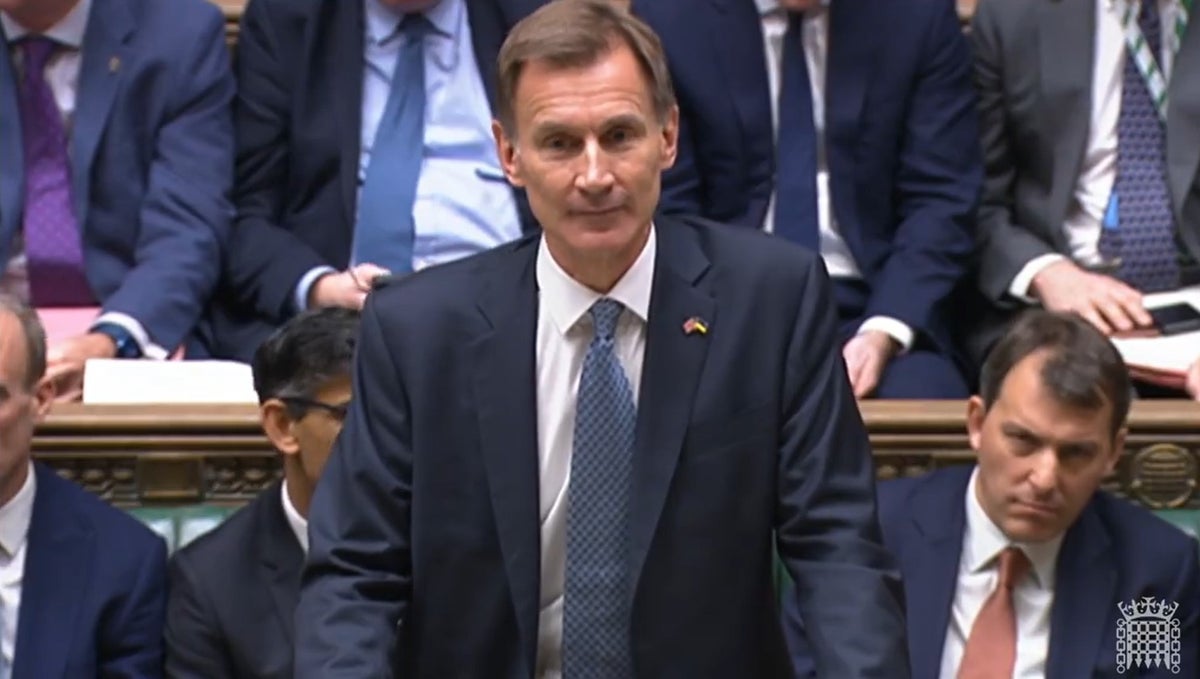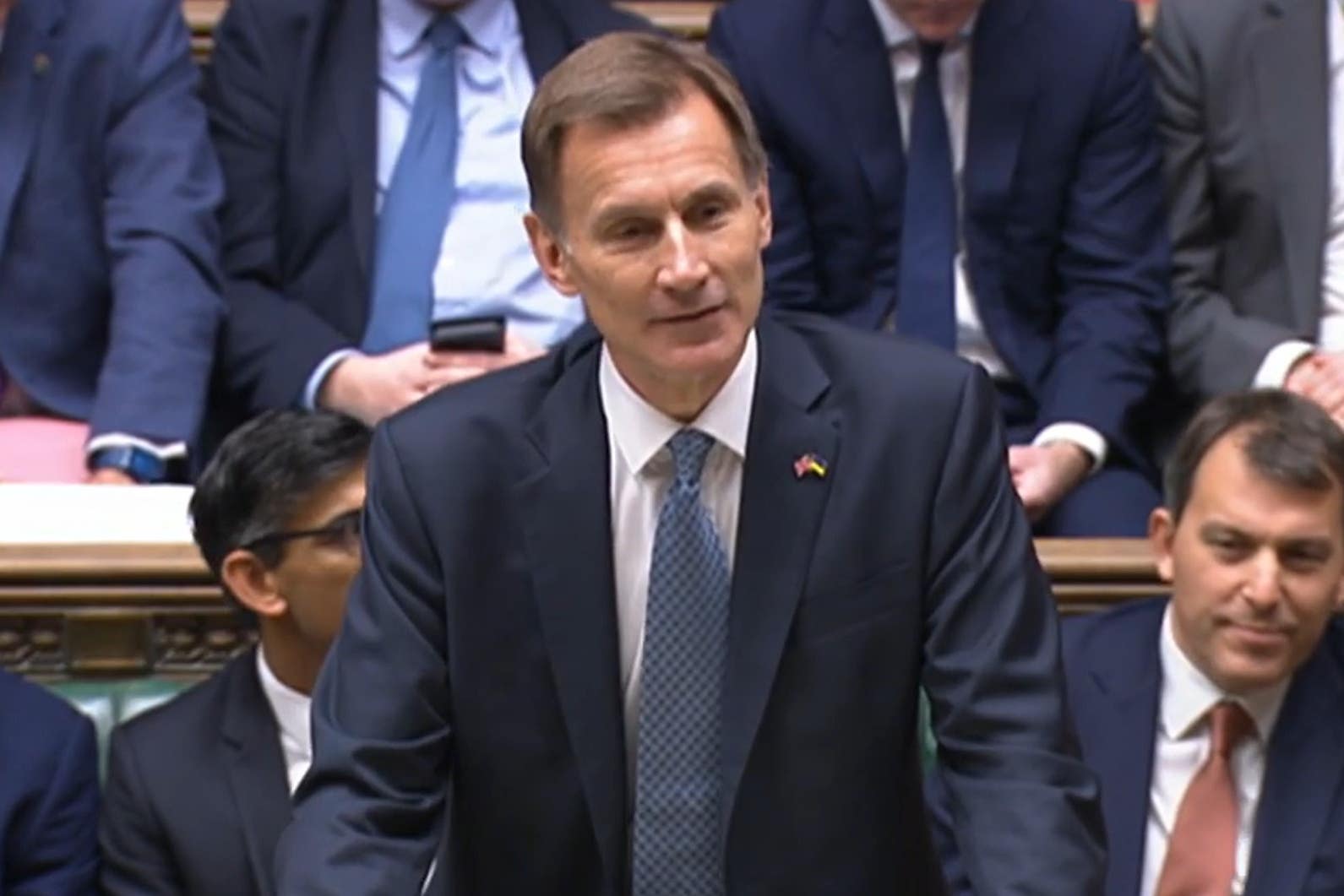
Jeremy Hunt has delivered his autumn statement, confirming tax rises for millions and deep public spending cuts as he seeks to repair the public finances following a series of shocks to the economy.
The chancellor said his plan would aim to “rebuild our economy” in the aftermath of the Covid pandemic, Liz Truss’s disastrous September mini-Budget and Russia’s ongoing war in Ukraine, which is fuelling rampant inflation.
Addressing MPs in the House of Commons on Thursday morning, Mr Hunt said the government’s priorities “are stability, growth, and public services”. He also vowed to “protect the most vulnerable.”
Mr Hunt set out some £30 billion in spending cuts and £24 billion in tax rises over the next five years. Here are some of the measures included in the budget and what they mean.

Personal tax thresholds
Mr Hunt confirmed he will freeze personal income tax thresholds for a further two years, in what has been described as a “stealth raid” on people’s incomes.
“I am maintaining at current levels the income tax personal allowance, higher rate threshold, main national insurance thresholds and the inheritance tax thresholds for a further two years taking us to April 2028," Mr Hunt said.
The threshold at which the 45p top rate of income tax is paid will be reduced from £150,000 to £125,140, although different rates apply in Scotland.
The income tax personal allowance, higher rate threshold, main national insurance thresholds and the inheritance tax thresholds will be frozen - this will result in more people paying more tax as a result of "fiscal drag" as wages increase.
Mr Hunt said that despite the freezes the UK would still have “the most generous set of tax-free allowances of any G7 country.”
The Resolution Foundation says the move will raise around £6bn.
Growth
The OBR has said that the UK is "now in recession", Mr Hunt said, but he added "overall this year, the economy is still forecast to grow by 4.2 per cent.
Mr Hunt promised his autumn statement will lead to a "shallower downturn" in the UK’s finances.
Underlying debt as a percentage of GDP is expected to fall from a peak of 97.6 per cent of GDP in 2025-26 to 97.3 per cent in 2027-28.
Energy
The energy price guarantee scheme will increase from £2,500 for the average household to £3,000 for 12 months from April, Mr Hunt confirmed.
The government will introduce additional cost-of-living payments for the "most vulnerable", with £900 for those on benefits, £300 for pensioners and £150 for those on a disability benefit.
The chancellor said he will cap the increase in social rents at a maximum of 7 per cent in 2023/24, saving the average tenant £200 next year.
Mr Hunt has accepted a recommendation to increase the national living wage by 9.7 per cent, making the hourly rate £10.42 from April 2023.
Inflation
The chancellor told MPs the Office of Budget Responsibility (OBR) has confirmed "global factors" are the "primary cause" of inflation.
The OBR forecasts the UK’s inflation rate to be 9.1 per cent this year and 7.4 per cent next year.
He said the autumn statement will cause inflation to "fall sharply from the middle of next year".
The chancellor confirmed the Bank of England’s remit will not be changed and it has his "wholehearted support in its mission to defeat inflation".
Other tax and spending
Mr Hunt said he would protect the increases in departmental budgets already set out in cash terms, before growing resource spending at 1 per cent a year in real terms over the next three years. He said public spending would grow "slower than the economy" - meaning real-terms cuts to budgets.
Electric vehicles will no longer be exempt from Vehicle Excise Duty from April 2025 to make the motoring tax system "fairer".
Mr Hunt increased the windfall tax on oil and gas giants from 25 per cent to 35 per cent and imposed a 45 per cent levy on electricity generators to raise an estimated £14 billion next year.
On business rates, Mr Hunt said the government will proceed with the revaluation of business properties from April 2023.
The stamp duty cuts announced in the mini-budget will remain in place but only until March 31 2025. Mr Hunt told the House the OBR expects housing activity to slow over the next two years.
On business taxes, the Chancellor said he had decided to freeze the Employers National Insurance Contributions threshold until April 2028. "We will retain the Employment Allowance at its new, higher level of £5,000," he said.
The chancellor rejected calls to put VAT on independent school fees.
Health
Mr Hunt said he will increase the NHS budget by an extra £3.3 billion in each of the next two years.
The NHS will be asked to "join all public services in tackling waste and inefficiency".
Mr Hunt said the NHS would publish an independently-verified plan for the number of doctors, nurses and other professionals needed in five, 10 and 15 years’ time.
He allocated for adult social care additional grant funding of £1 billion next year and £1.7 billion the year after.
Spending and benefits
Mr Hunt said "with just under half of the £55 billion consolidation coming from tax, and just over half from spending, this is a balanced plan for stability".
The chancellor said he will invest an extra £2.3 billion per year in schools over the next two years.
It will "not be possible" to return to the 0.7 per cent overseas aid target "until the fiscal situation allows", Mr Hunt said.
He said he will maintain the defence budget at at least 2 per cent of GDP.
Mr Hunt said he would move back the managed transition of people from employment and support allowance on to Universal Credit to 2028.
The implementation of the Dilnot reforms will be delayed for two years, Mr Hunt confirmed, announcing an increase in funding for the social care sector of up to £2.8 billion next year and £4.7 billion the following year.
The Barnett consequentials of the autumn statement mean an extra £1.5bn for the Scottish government, £1.2bn for the Welsh government, and £650m for the Northern Ireland executive.
The chancellor said he would not cut "a penny" from Government capital budgets over the next two years, and would then maintain them at that level for the next three years.
Working age and disability benefits will increase in line with inflation, with a rise of 10.1 per cent, costing £11 billion.
State pensions will increase in line with inflation in April, as Mr Hunt announced the "biggest ever cash increase in the state pension".
Climate and energy
Mr Hunt said "we remain fully committed to the historic Glasgow Climate Pact agreed at COP26 including a 68% reduction in our emissions by 2030".
The chancellor said he would add an extra £6 billion of investment in energy efficiency from 2025 to help meet a new ambition of reducing energy consumption from buildings and industry by 15 per cent by 2030, adding this could - according to today’s prices - save £28 billion from the national energy bill or £450 off the average household bill.
The government will proceed with the new nuclear plant at Sizewell C.







